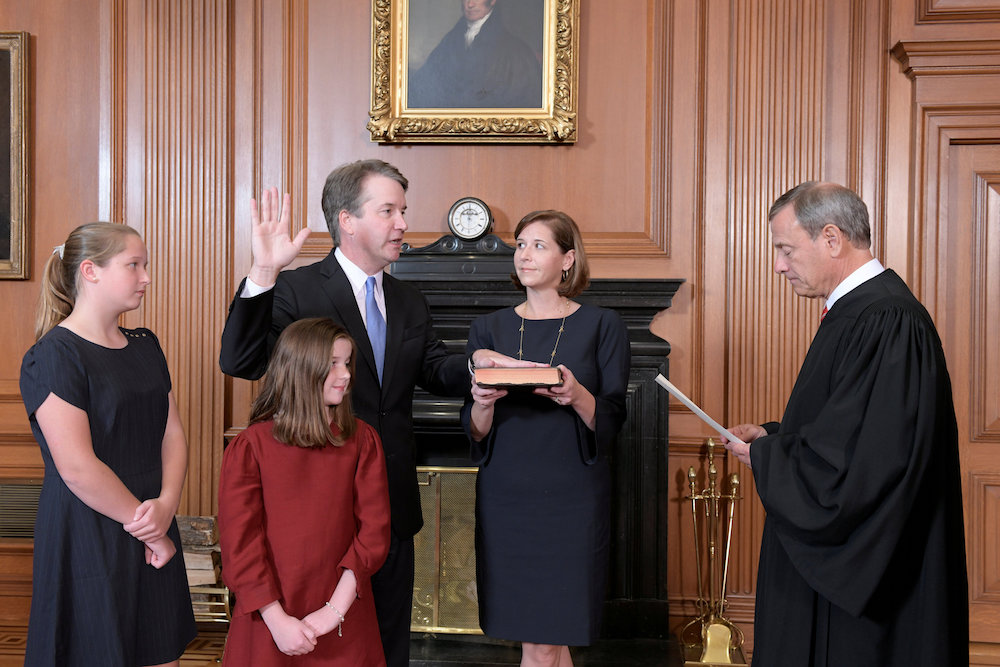The Senate voted 50-48 Saturday to confirm the nomination of Judge Brett Kavanaugh to the Supreme Court. The vote follows a procedural decision Friday to invoke ‘cloture,’ ending the debate on whether or not to ratify the judge’s nomination.
The Oct. 6 vote followed weeks of hearing and debate over Kavanaugh’s record as a judge, and also allegations of sexual misconduct made against Kavanaugh dating back to the 1980s.
Both Judge Kavanaugh and his primary accuser, Christine Blassey Ford, appeared before a session of the Senate Judiciary Committee Sept. 27. Following those appearances, a further FBI report was compiled and made available to senators Oct. 4.
The vote marks the end of one of the longer Supreme Court confirmation processes ever held.
The result hinged on four senators, three Republicans and one Democrat, who did not make their intentions clear until the final hours of deliberation.
Republican Senators Jeff Flake (AZ) and Susan Collins (ME) were joined by Sen. Joe Manchin (D-WV) in voting in favor of ending the debate Friday. All three voted to confirm Kavanaugh on Saturday morning.
Sen. Flake had previously called for the additional vetting of Kavanaugh by the FBI and declared that the report given to the Senate Oct. 4 contained “no additional information yet—no additional corroborating information” on the allegations which had been made against the judge.
Sen. Lisa Murkowski (R-AK) was the only Republican to break with her party and announce she would vote against both cloture and confirming the nomination. On Friday she announced she would be voting against Kavanaugh’s nomination, despite believing him to be “a good man.”
“In my view, he’s not the right man for the court at this time,” she said.
Murkowski actually voted “present,” neither for nor against Kavanaugh, so that Sen. Steve Daines (R-MT) could attend his daughter’s wedding. This was an example of the parliamentary convention of “pairing,” where an absent member arranges for another member intending to vote the other way to abstain.
After voting in favor of ending debate and bringing the process to a head on Friday, Sen. Collins told reporters that she had still to make up her mind.
“I will be voting yes on proceeding to the final confirmation vote and I will announce my intentions on how to vote later today,” Collins told reporters. She later made a near 50 minute statement on the floor of the Senate in which she said that she would back Kavanaugh’s nomination.
Collins called the process of vetting the judge a “dysfunctional circus” and said that the allegations against him had failed to meet even a "more likely than not standard."
Along with Sen Murkowski, Collins is a supporter of abortion rights, and was thought at one time to be considering voting against Kavanaugh in the face of widespread pressure from abortion advocates who believe that his elevation to the Supreme Court might trigger a revisiting of the decision Roe v. Wade.
When confirmation hearings on Kavanaugh’s nomination began before the Senate Judiciary Committee at the beginning of September, pro-abortion advocates mounted a public campaign to sway senate votes.
Rachel O’Leary Carmona, chief operating officer of the Women’s March, said at the time that the reason pro-abortion protestors had disrupted Kavanaugh’s confirmation hearings was because their “lives are at risk” and that “women will die if Kavanaugh is confirmed.”
O’Leary Carmona also said that politicians who refused to stop Kavanaugh would be made to “pay” during the November midterm elections and in 2020, saying, “if you’re a Democrat, we’ll primary you - if you’re a Republican, your seat will be flipped.”
Sen. Collins did, however, publicly praise Kavanaugh’s judicial record and said she did not think his nomination posed a threat to the landmark abortion decision.
Sen. Manchin is facing a closely fought reelection campaign in West Virginia, a state President Donald Trump carried in 2016 with 68 percent of the vote. His status as a pro-life politician has come under increasing scrutiny following public statements in support of Planned Parenthood and an August vote in the Senate to reject a measure that would have blocked federal government funding to the abortion provider.
If the final vote in the Senate had ended in a 50-50 stalemate, Vice President Mike Pence would have cast the deciding vote.
Despite the controversy which has subsequently surrounded his nomination, following allegations of sexual misconduct in high school, Brett Kavanaugh was originally hailed as an uncontroversial selection by President Trump.
At the time of his nomination, friends of the judge described him to CNA as a sincere Catholic committed to living out his faith.
Brett Kavanaugh was nominated on July 9 to succeed Justice Anthony Kennedy, for whom he once worked as a clerk. Kennedy is also a practicing Catholic.
In July, friends of the nominee described him as a sincere and humble man. Shannen Coffin, an attorney in Washington, D.C., who has known him for 20 years, told CNA at the time that Kavanaugh was “a devoted father, and spouse,” and someone with a strong ethic of service.
“He's also the guy who after a day of long meetings with senators, you know, and without fanfare, was serving food to the homeless.”
Another long-time friend of Kavanaugh, Msgr. John Enzler, CEO and president of Catholic Charities for the Archdiocese of Washington, D.C., told CNA that the judge was “a guy who's very friendly, very outgoing, very nice, lot of laughter, big smile, wonderful father, wonderful husband, man of faith, lives his faith, goes to church every week."
As he takes his seat on the Supreme Court, Brett Kavanaugh brings the number of Catholics sitting on the bench back up to six out of the nine justices. Chief Justice John G. Roberts is a practicing Catholic, as are Justices Clarence Thomas, Samuel Alito, and Sonia Sotomayor.
Justice Neil Gorsuch was baptized Catholic and received the sacrament of Confirmation, though he has reportedly attended an Episcopalian church for a number of years.

